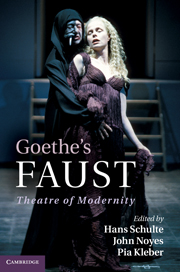Book contents
- Frontmatter
- Contents
- List of illustrations
- List of contributors
- Preface
- List of abbreviations
- Introduction
- PART I MODERNITY
- PART II THEATRE
- 13 Goethe's Faust: theatre, meta-theatre, tragedy
- 14 Faust beyond tragedy: hidden comedy, covert opera
- 15 Theatricality and experiment: identity in Faust
- 16 Rhetorical action: Faust between rhetoric, poetics and music
- 17 Directing Faust: an interview
- 18 A contradictory whole: Peter Stein stages Faust
- 19 Re-thinking and staging Goethe's Faust at the State Theatre Stuttgart 2005–6
- 20 Strehler's Faust in performance
- Select bibliography
- Index
19 - Re-thinking and staging Goethe's Faust at the State Theatre Stuttgart 2005–6
Published online by Cambridge University Press: 01 June 2011
- Frontmatter
- Contents
- List of illustrations
- List of contributors
- Preface
- List of abbreviations
- Introduction
- PART I MODERNITY
- PART II THEATRE
- 13 Goethe's Faust: theatre, meta-theatre, tragedy
- 14 Faust beyond tragedy: hidden comedy, covert opera
- 15 Theatricality and experiment: identity in Faust
- 16 Rhetorical action: Faust between rhetoric, poetics and music
- 17 Directing Faust: an interview
- 18 A contradictory whole: Peter Stein stages Faust
- 19 Re-thinking and staging Goethe's Faust at the State Theatre Stuttgart 2005–6
- 20 Strehler's Faust in performance
- Select bibliography
- Index
Summary
THE POINT OF DEPARTURE: WHY FAUST TODAY?
In the five or so years since Peter Stein's project of staging the complete Faust, Goethe's text has seen an astonishing revival on major German stages. The Hamburger Schauspielhaus, Deutsches Theater Berlin and the State Theatre Stuttgart presented their productions of Faust almost simultaneously. Clearly, there has been a surge of renewed general interest in Goethe's major dramatic and poetic work. Moreover, German theatres have begun to feel the limits of ‘post-dramatic’ and ‘pop-theatre’ productions, with their deconstruction of dramatic conventions and textual structures, and returned to great narratives like Goethe's Faust. This work also seemed to present a much more relevant model for the discussion of our ‘postmodernity’ than those experiments in style and performance. Goethe's Faust had emerged between the French and the Industrial Revolutions, the two pivotal events of our modernity, and had anticipated, from this vantage point, not only the evolution of post-medieval man and society, but also their fate, our own rather rootless and anxiety-ridden world.
Of course, such a critique of our time is not immediately obvious to a reader of Faust. We as theatre producers have to ‘reveal’ it. Staging the classical play in such a relevant way serves one essential purpose: it allows us to step out of our time and look at it from the viewpoint of the historical model. Only by historicizing our experience can we subvert current ideologies and stereotypes – Brecht taught us that many decades ago.
- Type
- Chapter
- Information
- Goethe's FaustTheatre of Modernity, pp. 293 - 305Publisher: Cambridge University PressPrint publication year: 2011



